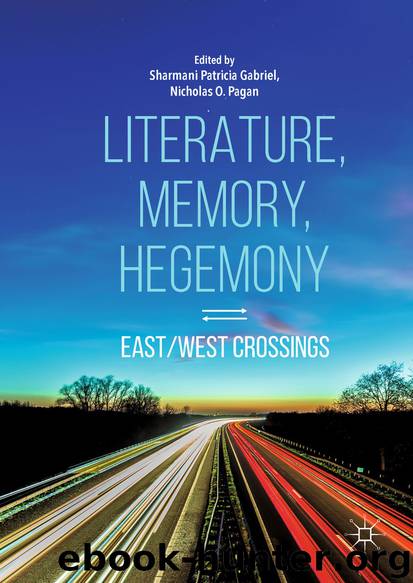Literature, Memory, Hegemony by Sharmani Patricia Gabriel & Nicholas O. Pagan

Author:Sharmani Patricia Gabriel & Nicholas O. Pagan
Language: eng
Format: epub
Publisher: Springer Singapore, Singapore
6. Identity and Mis/Identification: The Asylum Seeker in Roma Tearne’s The Swimmer
Sanghamitra Dalal1
(1)Department of Artistic Writing, Faculty of Film, Theatre and Animation, Universiti Teknologi MARA, Shah Alam, Malaysia
Sanghamitra Dalal
Keywords
ImmigrationIdentity representationAsylum seekerTerrorismBritainMulticulturalismRoma Tearne The Swimmer
Introduction
In “Super-diversity and its implications,” Steven Vertovec proposes the term “super-diversity” to indicate the complexity of the emergent social and political landscape of Britain in the twenty-first century. He points out that Britain’s multiculturalism and ethnic diversity can no longer be understood simply in terms of the inflows of immigrant populations from the former colonies of the Commonwealth, but must now also include a consideration of the “differential immigration statuses and their concomitant entitlements and restrictions of rights, divergent labour market experiences, discrete gender and age profiles, patterns of spatial distribution, and mixed local area responses by service providers and residents” (Vertovec 2007, p. 1025).
Indeed, immigration is a complex phenomenon and increasingly becoming a very sensitive global issue. Rising geographical movements across the globe have given rise to debates on national security and forms of international relations often considered a direct threat to national sovereignty. Questions of immigration linked to questions of identity and national belonging, national security, and national collective solidarity have begun to dominate global political discourse.
A number of traumatic incidents, such as the terrorist attacks perpetrated by Islamic extremists in New York, Madrid, and London in 2001, 2004, and 2005 respectively have intensified hostility or antagonism directed in particular at immigrants from the Middle East and elsewhere. Paradoxically, the scale of migrations to European countries has increased despite escalating state terrorism, political repression, and sponsored warfare in the name of the “war on terror”.
This chapter examines the novel The Swimmer by Sri Lankan-born, British author and filmmaker, Roma Tearne , who was only ten years old when her family left Colombo—and the civil war raging in their homeland—for London in 1964. Tearne trained as a painter and filmmaker at the Ruskin School of Fine Art, Oxford and then was Leverhulme artist in residence at the Ashmolean Museum, Oxford. 1 As a daughter of a Tamil father and a Sinhalese mother, Tearne experienced the divisive effects of ethnic conflict within her own family. While her early work focuses on the historical violence of the Sri Lankan civil war and its repercussions on the lives of her characters, her subsequent fiction also incorporates the often violent race relations that were playing out in contemporary British society. The context of trauma and alienation is thus extended from Sri Lanka to the UK, where the main characters of Tearne’s novels have relocated with the hope of rebuilding their lives and carving out new identities for themselves.
Set against the shifting social and political landscape of the post-7/7 London bombings in Britain, Tearne’s fourth novel The Swimmer (2010) foregrounds issues of arbitrary violence, loss, and bereavement both in Britain and Sri Lanka and also reflects on the implications of the false dichotomies between the “civilized moderation of the West” and the “violent extremism of the East”. The novel traces the
Download
This site does not store any files on its server. We only index and link to content provided by other sites. Please contact the content providers to delete copyright contents if any and email us, we'll remove relevant links or contents immediately.
Call Me by Your Name by André Aciman(20517)
Ready Player One by Cline Ernest(14675)
How to Be a Bawse: A Guide to Conquering Life by Lilly Singh(7486)
Wiseguy by Nicholas Pileggi(5786)
The Kite Runner by Khaled Hosseini(5179)
On Writing A Memoir of the Craft by Stephen King(4944)
Audition by Ryu Murakami(4930)
The Crown by Robert Lacey(4817)
Call me by your name by Andre Aciman(4684)
Gerald's Game by Stephen King(4654)
Harry Potter and the Cursed Child: The Journey by Harry Potter Theatrical Productions(4507)
Dialogue by Robert McKee(4404)
The Perils of Being Moderately Famous by Soha Ali Khan(4220)
Dynamic Alignment Through Imagery by Eric Franklin(4217)
Apollo 8 by Jeffrey Kluger(3709)
The Inner Game of Tennis by W. Timothy Gallwey(3687)
Seriously... I'm Kidding by Ellen DeGeneres(3634)
How to be Champion: My Autobiography by Sarah Millican(3593)
Darker by E L James(3516)
